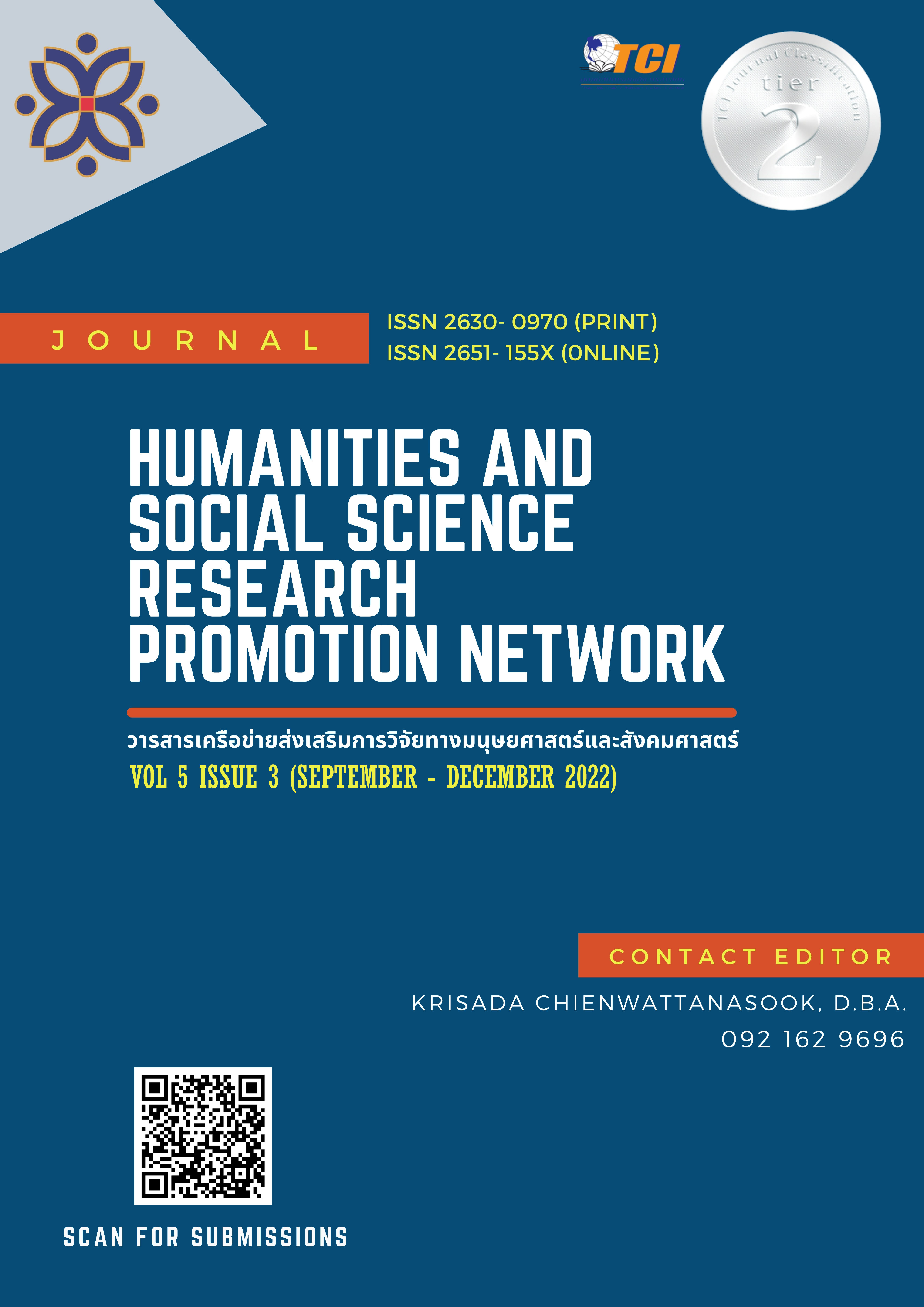มุมมองผู้ประกอบการชาวอินเดียต่อค่านิยมทรัพยากรมนุษย์ในองค์กร บริษัทอินเดียข้ามชาติอินเดียในกรุงเทพมหานคร
คำสำคัญ:
บริษัทข้ามชาติ , ค่านิยม , ผู้ประกอบการบทคัดย่อ
การศึกษาค่านิยมองค์กรการดำเนินงานของบริษัทข้ามชาติอินเดียในกรุงเทพมหานคร ตามวัตถุประสงค์การวิจัย เพื่อศึกษาถึงมุมมองการพัฒนาประสิทธิภาพค่านิยมองค์กรของพนักงานบริษัทข้ามชาติอินเดียในประเทศไทยโดยการสัมภาษณ์ผู้ที่เกี่ยวข้องในบริษัทข้ามชาติอินเดียในกรุงเทพฯ จำนวน 7 คน และจัดสัมมนากลุ่ม นักธุรกิจอินเดียในประเทศไทย ผลการศึกษาพบว่า การทำงานของชาวอินเดียมีความเป็นสากล มีมาตรฐาน ได้รับการยอมรับและความร่วมมือในการทำงานในบริษัทข้ามชาติถือเป็นการทำงานที่มีมาตรฐานสูงของบริษัทข้ามชาติในหลาย ๆ ประเทศ และสร้างความเท่าเทียมกันในด้านคุณภาพเช่นกัน ค่านิยมองค์กรข้ามชาติของอินเดีย นอกจากนี้ยังสอดคล้องกับพฤติกรรมองค์กรสมัยใหม่ และบริษัทอินเดียในปัจจุบันพร้อมที่จะพัฒนาความก้าวหน้าทั้งในประเทศไทยและในระดับสากลอย่างมีประสิทธิภาพ
เอกสารอ้างอิง
Adler, R., Mansi, M., & Pandey, R. (2021). Accounting for waste management: a study of the reporting practices of the top listed Indian companies. Accounting & Finance. 1-37.
Barnett, T., Cochran, D. S., & Taylor, G. S. (1993). The internal disclosure policies of private-sector employers: An initial look at their relationship to employee whistleblowing. Journal of Business Ethics, 12(2), 127-136.
Beer, M., Spector, B. A., Lawrence, P. R., Mills, D. Q., & Walton, R. E. (1984). Managing human assets. Simon and Schuster.
Brewster, D. (2013). India's Defense Strategy and the India-ASEAN Relationship. India Review, 12(3), 151-164.
Cotton, D. R., Warren, M. F., Maiboroda, O., & Bailey, I. (2007). Sustainable development, higher education and pedagogy: a study of lecturers' beliefs and attitudes. Environmental Education Research, 13(5), 579-597.
Donker, H., Poff, D., & Zahir, S. (2008). Corporate values, codes of ethics, and firm performance: Alook at the Canadian context. Journal of business ethics, 82(3), 527-537.
Goleman, D. (2021). Leadership: The power of emotional intelligence. More than Sound LLC.
Kolodinsky, R. W., Giacalone, R. A., & Jurkiewicz, C. L. (2008). Workplace values and outcomes: Exploring personal, organizational, and interactive workplace spirituality. Journal of business ethics, 81(2), 465-480.
Lawler, J. J., Jain, H. C., Venkata Ratnam, C. S., & Atmiyanandana, V. (1995). Human resource management in developing economies: a comparison of India and Thailand. International Journal of Human Resource Management, 6(2), 319-346.
Mahamud, T., Janeprakon, C., Srikacha, W., & Chaiponoi, S. (2019). Human Resource Management Practices Transfer in Multinational Indian Companies in Bangkok. Asian Journal of Behavioural Sciences, 1(1), 19-26.
Malik, A., Budhwar, P., Patel, C., & Laker, B. (2021). Holistic indigenous and atomistic modernity: Analyzing performance management in two Indian emerging market multinational corporations. Human Resource Management, 60(2), 803-823.
Mol, R., Singh, B., Chattu, V. K., Kaur, J., & Singh, B. (2021). India’s Health Diplomacy as a Soft Power Tool towards Africa: Humanitarian and Geopolitical Analysis. Journal of Asian and African Studies, 00219096211039539.
Moran, T. H. (1998). Foreign direct investment and development: The new policy agenda for developing countries and economies in transition. Peterson Institute.
Nedelko, Z., & Potocan, V. (2021). Sustainability of Organizations: The Contribution of Personal Values to Democratic Leadership Behavior Focused on the Sustainability of Organizations. Sustainability, 13(8), 4207.
Olaizola, E., Morales, R.S, & Eguiguren Huerta, M. (2021). Biomimetic Leadership for 21st Century Companies. Biomimetics, 6(3), 47.
Raj, P. S., & Ambrose, B. (2014). Prospects of Emerging Comprehensive Economic Cooperation Agreement between India and Thailand. Language in India, 14(1), 678.
Sambharya, R. B., & Goll, I. (2021). Do international and product diversification strategies affect human rights and employee orientation disclosures? An across-country empirical study of large multinational enterprises. Global Strategy Journal, 11(2), 245-268.
Sen, R., Asher, M. G., & Rajan, R. S. (2004). ASEAN-India economic relations: current status andfuture prospects. Economic and Political Weekly, 3297-3308.
Sepasi, S., Rexhepi, G., & Rahdari, A. (2021). The changing prospects of corporate socialresponsibility in the decade of action: Do personal values matter?. Corporate Social Responsibility and Environmental Management, 28(1), 138-152.
Shukla, S. (2021). India abroad: Diasporic cultures of postwar America and England. Princeton University Press.
Sikdar, C., & Nag, B. (2011). Impact of India-ASEAN Free Trade Agreement: A cross-country analysis using applied general equilibrium modelling (No. 107). ARTNet Working Paper Series.
Singh, N.P. (2022). The rise of emerging Indian multinationals: strategic learning for EMNC foreign market entry and internationalization. International Journal of Emerging Markets, 17(10), 2740-2762.
Singh, V. K., Tubsree, C., & Sakulkoo, S. (2020). Trust Creation in Cross Cultural Environment of Indian Companies in Manufacturing Sector in Thailand. HRD JOURNAL, 11(1), 77-89.
Suteethorn, C. (2008). Economic Cooperation between Thailand and India and its Implications for the Asian Community. In Economic Integration in Asia and India (pp. 89-115).
Turner, L. (1974). Multinational companies and the Third World. The World Today, 30(9), 394-402.
Turró, A., Urbano, D., & Peris-Ortiz, M. (2014). Culture and innovation: The moderating effect of cultural values on corporate entrepreneurship. Technological Forecasting and Social Change, 88, 360-369.
Van Deth, J. W., & Scarbrough, E. (Eds.). (1995). The impact of values (Vol. 4). Oxford University press.
ดาวน์โหลด
เผยแพร่แล้ว
รูปแบบการอ้างอิง
ฉบับ
ประเภทบทความ
สัญญาอนุญาต
ลิขสิทธิ์ (c) 2022 ทศพร มะหะหมัด

อนุญาตภายใต้เงื่อนไข Creative Commons Attribution-NonCommercial-NoDerivatives 4.0 International License.
บทความที่ได้รับการตีพิมพ์เป็นลิขสิทธิ์ของ ผู้เขียน
ทัศนะและความคิดเห็นที่ปรากฏในบทความในวารสารเครือข่ายส่งเสริมการวิจัยทางมนุษยศาสตร์และสังคมศาสตร์จะถือเป็นความรับผิดชอบของผู้เขียนบทความนั้น และไม่ถือเป็นทัศนะและความรับผิดชอบของกองบรรณาธิการ








